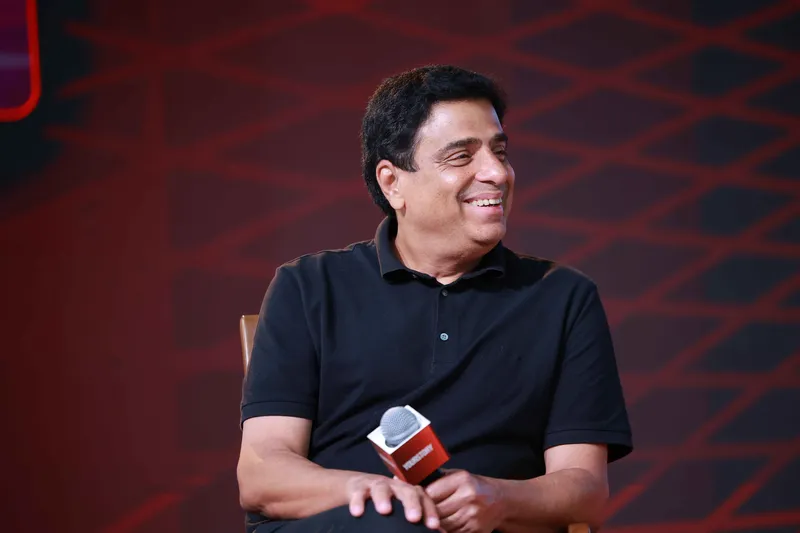When you ask a supremely successful person to share their mantra for success, they tend to keep it simple. Because as the saying goes: the doers don’t talk, they just do. And Ronnie Screwvala, a celebrated entrepreneur, investor, philanthropist, author, and film producer, is no different.
Gracing the stage on Day Two of TechSparks Bengaluru 2024, the 68-year-old multi-hyphenate told an auditorium full of young, aspirational founders that they just “need to stay the course” and be “stoic to their own vision”, no matter what.
“Nothing is happening in a hurry. You have to build yourself to stay the course. When I started the media business in the 1990s, there were 700 entrepreneurs who went forward in the media, and I think I was one of the last 15 that stuck it out all that time. And that’s really when the value came in,” he shared during a fireside chat with YourStory Founder and CEO Shradha Sharma.
“In entrepreneurship, if you have a Plan B, then you’re dead. That’s what MBA students do. A great idea is not built with consensus, and it is never built with 40 different people’s views… it has to be your vision or you’re in trouble,” he shared.
In his four decades as a serial entrepreneur, industrialist, and change-maker, Screwvala has got a ring-side view of multiple sectors, from education to sports to movies and more. Few in India Inc have earned as much regard and influence as him, all of which he attributes to sincerity and steadfastness.
“Sincerity in entrepreneurs makes an incredible amount of difference,” he said, adding, “If you are sincere, you come across as sincere to your consumer, to your team, to your advisors, and the whole ecosystem will take you for what you are.”

Calm in the face of the storm
No entrepreneurship journey is without its challenges, or as Screwvala puts it, “Nothing is ever built in calm waters. If you build something in calm waters, chances are that it would sink every time one little wave comes about. Nobody is going to give you a tailwind. So, life is all about waves, and you have to be a part of it.”
For Screwvala, exalted valuations of companies are never the barometer of success. On the contrary, he’d reward a business and an entrepreneur that stayed the course and was “the last man standing”.
“Why would you look up to a unicorn? When you start benchmarking yourself with unicorns, your next step is even more (difficult),” he said.
Elaborating further, he shared, “It’s a great thing to say that you got valued at that (level). But the pressure you put on yourself, your team, and your colleagues is too onerous. Out of the 100 unicorns that happened during Covid, 75 of them got demoted. I’d say about 25 of them that got revalued with another primary round are still unicorns.”
Challenges also come in the form of scale, or the lack of it. In India, particularly, scaling a business is incredibly tough and the “0-1 and 1-10 unicorn terminologies” have made it a lot more complicated, according to Screwvala.
“The worst thing you can do while scaling your business is to burn a lot of money. Because at some stage, you will have to burn less money and then your scale will come down. That’s why we shouldn’t be celebrating unicorns that got a lot of ‘free money’ at a value that was beyond what it should have been, and then their spending-ratio-to-scale-ratio was just poor,” he observed.
State of edtech
Ask the upGrad founder about the state of edtech in India today—a sector reeling in some pretty choppy waters—and he minces no words. “People who don’t know how to run their businesses, I don’t have condolence messages for them,” Screwvala quipped.
“If some unicorns could not make it to the finishing line, that doesn’t mean that the entire industry is tainted. Earlier, there was no acceptance that there is a problem. That non-acceptance was a cumulative destruction of value. Three years of non-acceptance can diminish your value to two hundred feet less than zero,” he said.
In an earlier interview with The CapTable, Screwvala had urged critics and commentators to look at other sectors. “YES Bank went through a hammering, right? But did the whole banking sector collapse? Airlines are going through a hammering. The power sector went through problems. Telecom had its own challenges. But did the whole telecom industry come down because of the 2G scam? Not at all. In fact, it only got strengthened and consumers benefited. One player does not define a sector,” he asserted.
“If you had one rotten apple in the K-12 space, why would that define the sector?” Screwvala questioned.
And neither does one segment, K-12, define a segment. In Screwvala’s opinion, learning and upskilling are far more important areas in edtech where upGrad is looking to make a mark. “How can the context of learning and skilling of 1.3 billion people not be important? Even the Govt has realised its importance now for the creation of jobs,” he emphasised.
Screwvala then signed off, saying, “Skilling and learning is absolutely in good and safe hands.”



![Read more about the article [Weekly funding roundup] Unicorns boost venture capital activity; startups raise $740M in third week of June](https://blog.digitalsevaa.com/wp-content/uploads/2021/05/Weeklyimage-1577460362436-300x150.png)



![Read more about the article [Funding alert] B2B buyer intelligence startup Slintel raises $20M in Series A round led by GGV Capital](https://blog.digitalsevaa.com/wp-content/uploads/2021/06/Imageg8wd-1623297140745-300x150.jpg)



